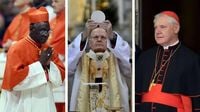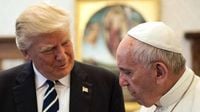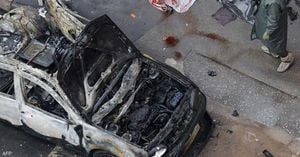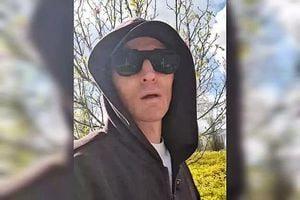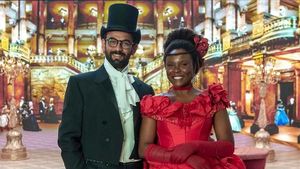Pope Francis, who passed away at the age of 88, leaves behind a complex legacy that intertwines spirituality and global politics. His funeral is scheduled for Saturday, April 26, 2025, in Rome, with numerous world leaders expected to attend, reflecting the significant impact he had during his papacy.
Since his election in 2013, Pope Francis was seen as a reformer within the Catholic Church, championing the causes of the poor and marginalized. He was vocal about international conflicts, famously stating, "War is always a defeat. I call again for the madness of violence to end and for a just and lasting peace to be pursued," in a post on social media platform X.
As the Church begins the search for a new leader, the question arises: how political is the papacy, and what influence does it wield beyond the Vatican walls? In an interview with fr.de, Professor Thomas Söding, a theologian at Ruhr University Bochum and Vice President of the Central Committee of German Catholics, discussed the papal role in politics.
Söding explained that while the Pope is the head of state of the Vatican, he does not possess direct political or economic power. Instead, he holds what is termed "moral authority." The Church often operates similarly to a humanitarian organization, striving to mediate in conflicts without taking sides. This approach was evident when Pope Francis suggested to Ukraine in Spring 2024 to raise a "white flag" as a gesture in its defense against Russia, a statement that was met with international outrage, as many interpreted it as a call for capitulation.
The election of Francis, who hails from Argentina, signified a political shift, bringing the global South into the conversation within the Church. Söding noted that even if the next Pope is Italian, he will lead a Church that has become more open to global perspectives.
However, the political implications of the papacy extend beyond the Vatican. Figures like Russian President Vladimir Putin and former U.S. President Donald Trump have expressed admiration for Francis, utilizing religious rhetoric for their political agendas. Söding raised concerns about the potential for the Catholic Church to become a pawn in political games, referencing a visit by U.S. Vice President JD Vance to the late Pope, where Vance cited Augustine’s concept of "Order of Love" to justify U.S. immigration policies. Söding criticized this use of Church teachings, stating, "What is, of course, complete nonsense."
In the wake of Francis' death, the question of who will succeed him looms large. The College of Cardinals is already discussing potential candidates, known as "Papabili." Among the frontrunners are Cardinal Matteo Zuppi, the Archbishop of Bologna, who is known for his diplomatic skills and current role as the Pope's special envoy for peace in Ukraine. Zuppi's connections with the influential Sant'Egidio community align him closely with Francis' vision.
Another strong candidate is Cardinal Pietro Parolin, the Vatican Secretary of State, recognized for his diplomatic efforts, particularly in relations with China. However, his association with the Francis era might hinder his chances if the Cardinals seek a radical shift in direction.
Pierbattista Pizzaballa, the first Patriarch of Jerusalem, is also in contention. His diplomatic style and experience in navigating the complex political landscape of the Middle East could serve him well in a future conclave.
On the conservative side, Cardinal Peter Erdő, the Archbishop of Budapest, represents traditional values and has been a vocal critic of Francis' progressive policies. Erdő's experience and connections could appeal to those seeking a return to a more conservative papacy.
Cardinal Victor Manuel Fernandez, a close confidant of Pope Francis, is another contender. As Prefect of the Dicastery for the Doctrine of the Faith, he has been involved in controversial discussions around issues like the blessing of same-sex unions, which have caused significant backlash, particularly in Africa.
Additionally, Cardinal Luis Antonio Tagle from the Philippines could make history as the first Pope from Asia. Tagle was a prominent figure during the previous conclave and remains a popular choice among many Catholics worldwide.
As the Church prepares for the upcoming conclave, the question of political influence remains significant. Söding emphasized that while external pressures exist, especially from countries like China, the Cardinals are likely to be discerning in their choices, as they are an elite group well-acquainted with the implications of their decisions.
The internal dynamics of the Church will also play a crucial role in the selection of the next Pope. The ongoing synodal renewal process within the Church is vital, as it will shape the candidates' abilities to lead effectively in a changing world.
The legacy of Pope Francis, though marked by challenges, has opened many doors within the Church. As Christine Bußhardt, a pastoral officer, noted, there is hope for future leaders to build on his groundwork, particularly in fostering a Eucharistic community among all baptized Christians.
In summary, the death of Pope Francis marks a pivotal moment for the Catholic Church, as it embarks on the search for a new leader amidst a backdrop of political complexities and societal expectations. The next Pope will not only inherit Francis' vision but will also face the significant challenge of navigating the intersection of faith and politics in an increasingly polarized world.
